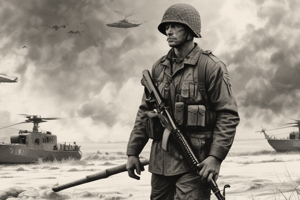Podcast
Questions and Answers
What was the primary reason the US engaged in the Vietnam War?
What was the primary reason the US engaged in the Vietnam War?
The Vietnam War was solely a conflict between Vietnam and the United States.
The Vietnam War was solely a conflict between Vietnam and the United States.
False (B)
What military strategy did the Viet Cong use against the US forces?
What military strategy did the Viet Cong use against the US forces?
Guerilla warfare
The US believed in the ______ theory, which suggested that if one country fell to communism, others would follow.
The US believed in the ______ theory, which suggested that if one country fell to communism, others would follow.
Signup and view all the answers
Match the following reasons for US defeat with their descriptions:
Match the following reasons for US defeat with their descriptions:
Signup and view all the answers
Which factor provided significant support to the North Vietnamese government?
Which factor provided significant support to the North Vietnamese government?
Signup and view all the answers
Vietnam had no allies during the conflict with the United States.
Vietnam had no allies during the conflict with the United States.
Signup and view all the answers
What was one reason for the US's initial stance of limited intervention in the Vietnam War?
What was one reason for the US's initial stance of limited intervention in the Vietnam War?
Signup and view all the answers
What was a primary objective of the US strategy during the Vietnam War?
What was a primary objective of the US strategy during the Vietnam War?
Signup and view all the answers
The US's limited war strategy successfully led to a decisive victory in the Vietnam War.
The US's limited war strategy successfully led to a decisive victory in the Vietnam War.
Signup and view all the answers
What form of warfare did the Vietnamese primarily use during the Vietnam War?
What form of warfare did the Vietnamese primarily use during the Vietnam War?
Signup and view all the answers
The belief that if one country falls to communism, others in the region will follow is known as the __________ theory.
The belief that if one country falls to communism, others in the region will follow is known as the __________ theory.
Signup and view all the answers
Match the following terms with their definitions:
Match the following terms with their definitions:
Signup and view all the answers
What was a significant weakness of the US strategy in the Vietnam War?
What was a significant weakness of the US strategy in the Vietnam War?
Signup and view all the answers
The Fall of Saigon marked the end of the Vietnam War.
The Fall of Saigon marked the end of the Vietnam War.
Signup and view all the answers
What was one of the main lessons learned from the Vietnam War?
What was one of the main lessons learned from the Vietnam War?
Signup and view all the answers
Study Notes
Vietnam War: Grade 12 History Perspective
- The Vietnam War was a conflict between the US and Vietnam, vital for Grade 12 exams.
- Key focus: understanding why the US failed to defeat Vietnam, despite its greater military power.
Historical Context
- Vietnam: A Southeast Asian country with a strong national identity.
- Cold War: A proxy war between the US and the Soviet Union, impacting Vietnam.
- Communism: North Vietnam was communist; South Vietnam was supported by the US.
- Domino Theory: US belief that the fall of Vietnam to communism would lead to similar outcomes in other Southeast Asian countries.
US Perspective
- Military Superiority: The US possessed superior technology and resources.
- Strategic Objectives: Containing communism and protecting US interests.
- Limited War: Initial US strategy to avoid a larger war with other powers.
Vietnamese Perspective
- Nationalism: Fierce resistance to foreign intervention.
- Guerrilla Warfare: Viet Cong employed effective tactics against US forces.
- Support from Allies: Received significant aid from the Soviet Union and China.
Factors Contributing to US Defeat
- Terrain and Climate: Dense jungle and mountains favoured the Viet Cong.
- Public Opinion: Growing anti-war sentiment in the US.
- Political Instability: Weak and corrupt South Vietnamese government.
- Limited War Strategy: The strategy hampered decisive victory.
- Overestimation of US Power: Underestimating Vietnamese resilience.
Key Terms
- Viet Cong: Communist guerilla force fighting alongside the North Vietnamese.
- Domino Theory: Belief that one country falling to communism leads to more.
- Limited War: A military strategy avoiding full-scale conflict.
- Guerilla Warfare: Warfare using small, mobile units for harassment.
Conclusion
- The Vietnam War was a complex conflict with lasting consequences.
- Key Lessons: Limitations of military power; understanding cultural and political contexts.
- Enduring Legacy: The war remains a subject of debate.
Additional Points
- Tet Offensive: A major turning point in the war, with surprise attacks.
- My Lai Massacre: A horrific incident with civilian casualties.
- Paris Peace Accords: 1973 agreement ending US involvement.
- Fall of Saigon: North Vietnam's capture of Saigon marking the war's conclusion.
Studying That Suits You
Use AI to generate personalized quizzes and flashcards to suit your learning preferences.
Description
This quiz focuses on the Vietnam War from a Grade 12 history perspective. Students will explore the complexities of US military involvement, as well as the Vietnamese resistance, and understand the broader implications of the conflict during the Cold War. Prepare to dive into key concepts, including nationalism, guerrilla warfare, and the significance of US failure despite its military might.




